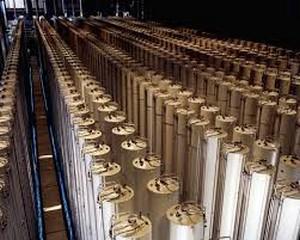Iran’s nukesIAEA confirms Iran enriching uranium in excess of 2015 nuclear deal limit
The United Nations atomic watchdog agency has confirmed that Iran has surpassed the limits on how much it was allowed to enrich uranium under the 2015 international nuclear deal. The International Atomic Energy Agency said its inspectors verified Monday that Iran has passed 4.5 percent enrichment, breaching the 3.67 percent limit set in the accord aimed at restraining Tehran’s nuclear weapons development.

The United Nations atomic watchdog agency has confirmed that Iran has surpassed the limits on how much it was allowed to enrich uranium under the 2015 international nuclear deal.
The International Atomic Energy Agency said its inspectors verified Monday that Iran has passed 4.5 percent enrichment, breaching the 3.67 percent limit set in the accord aimed at restraining Tehran’s nuclear weapons development.
The announcement comes hours after Iran’s nuclear energy agency said it had passed the limits and would also consider enriching uranium to 20 percent as the next step in its move to back away from its commitments under the nuclear deal.
Iran said it could take such action unless it gets the help it wants from the accord’s other signatories to overcome the crippling effect of U.S. economic sanctions imposed by U.S. President Donald Trump after he withdrew from the pact last year.
Uranium enriched to 5 percent is sufficient to produce fuel for nuclear power plants, but still far below the 90 percent needed for building a nuclear weapon.
The European Union, one of the signatories to the deal with Iran, said it was “extremely concerned” about Tehran’s action.
“We strongly urge Iran to stop and reverse all activities that are inconsistent with the commitments” it had made under the international agreement, the EU said in Brussels.
Russia said it is concerned about the Iranian action, but Kremlin spokesman Dmitry Peskov said it had warned that Trump’s withdrawal from the pact would have negative consequences for global security.
U.S. Vice President Mike Pence said Monday that the United States, under President Trump’s leadership, will “never allow Iran to obtain a nuclear weapon.” He said the United States will continue to “oppose Iran’s malign influence” and said “Iran should not confuse American restraint with a lack of American resolve.”
Trump warned Iran on Sunday it “better be careful.”
He did not specify to reporters any specific reactions his administration was considering, but reiterated the position that “Iran will never have a nuclear weapon.”
Trump made his comment hours after Secretary of State Mike Pompeo tweeted that Iran’s decision will lead to “further isolation and sanctions.”
“Nations should restore the longstanding standard of no enrichment for Iran’s nuclear program. Iran’s regime with nuclear weapons would pose an even greater danger to the world,” Pompeo wrote.
Iran has threatened further steps away from the deal within 60 days if the remaining signatories do not help it avoid the effects of the U.S. sanctions. The remaining parties, along with Russia and the EU, are Britain, Germany, France and China.
Meanwhile, Iranian Foreign Minister Mohammad Javad Zarif contended that Britain’s seizure of an Iranian oil tanker in Gibraltar last week has set “a dangerous precedent and must end now.”
Zarif said on Twitter, “Iran is neither a member of the EU nor subject to any European oil embargo. Last I checked, EU was against extraterritoriality. UK’s unlawful seizure of a tanker with Iranian oil … is piracy, pure and simple. It sets a dangerous precedent and must end now.”
British Royal Marines impounded the tanker on suspicion it was carrying oil to Syria in violation of European Union sanctions, a claim Iran denied.
Iranian President Hassan Rouhani said last week Iran was prepared to enrich “any amount that we want” beyond the 3.67 percent level. He further pledged to resume construction of the Arak heavy water reactor, a project Iran agreed to shut down when it signed the 2015 deal. Iran has also already gone past the 300-kilogram limit for the amount of enriched uranium it is allowed to keep in its stockpile.
This article is published courtesy of the Voice of America (VOA)
